2015年9月浙江高考英语听力(PETS-2)试题,原文及答案
2015年-高考英语真题---浙江卷及答案

2015年普通高等学校招生全国统一考试(浙江卷)英语试题本试卷分选择题和非选择题部分。
全卷满分120分,考试时间120分钟请考生按规定用笔将所有试题的答案涂、写在答题纸上。
注意事项:1.答题前,考生务必将自己的姓名、准考证号用黑色笔迹的签字笔或钢笔分别填写在试卷和答题纸规定的位置上。
2.每小题选出答案后,用2B铅笔把答题纸上对应的题目答案标号涂黑,如需改动,用橡皮檫干净后,再选涂其他答案标号。
不能答在试题卷上。
选择题部分(共80分)第一部分:英语知识应用(共两节,满分30分)第一节:单项填空(共20小题,每小题0.5分,满分10分)从A、B、C和D四个选项中,选出可以填入空白处的最佳选项,并在答题纸上将该选项标号涂黑。
1. ---Hi, John. Are you busy?.--- __________A. Yes. I do agree.B. Yes. That would be niceC. No. Are you sure?D. No. What’s up?2.Jane’s grandmother had wanted to write __________ children’s book for many years, but one thing or another always got in __________ way.A. a; 不填B. the; theC. 不填; theD. a; the3.Have you ever heard of the trees that are homes __________ animals both on land and sea?.A. aboutB. toC.withD. over4.It was so noisy that we __________ hear ourselves speak.A. couldn’tB. shouldn’tC.mustn’tD. needn’t5.Studies have shown that the right and left ear __________ sound differently.A. produceB. pronounceC. processD. download6. If you swim in a river or lake, be sure to investigate __________ is below the water surface. Often there are rocks and branches hidden in the water.A. whatB. whoC. thatD. whoever7.Body language can __________ a lot about your mood, so standing with your arms folded can send out a signal that you are being defensive.A. take awayB. throw awayC. put awayD. give away8. Albert Einstein was born in 1879. As a child, few people guessed that he __________ a famous scientist whose theories would change the world.A. has beenB. had beenC. was going to beD. was9.__________ a single word can change the meaning of a sentence, a single sentence can change the meaning of a paragraph.A. Just asB. In additionC. UntilD. Unless10.Most people work because it’s unavoidable. __________, there are some people who actually enjoywork.A. As a resultB. Even thoughC. By contrastD. In conclusion11.We tend to have a better memory for things that excite our senses or __________ our emotions than for straight facts.A. block offB. appeal toC. subscribe toD. come across12.How would you like __________ if you were watching your favorite TV program and someone came into the room and just shut it off without asking you?.A. themB. oneC. thoseD. it13.Most of us, if we know even a little about where our food comes from, understand that every biteput into our mouths was __________ alive.A. steadilyB. instantlyC. formerlyD. permanently14.Listening is thus an active, not a __________, behavior consisting of hearing, understanding and remembering..A. considerateB. sensitiveC. reliableD. passive15.One of the most effective ways to reduce __________ is to talk about feelings with someone you trust.A. productionB. stressC. energyD. power16.If steel is heavier than water, why are ships able to ___________ on the sea?A. floatB. drownC. shrinkD. split17.These comments came __________ special questions often asked by local newsmen.A. in memory ofB. in response toC. in touch withD. in possession of18.Listening to music at home is one thing, going to hear it __________ live is quite another.A. performB. performingC. to performD. being performed19.Creating an atmosphere __________ employees feel part of a team is a big challenge.A. asB. whoseC. in whichD. at which20.—Why don’t you consider a trip to, say, Beijing or Hangzhou?—__________.A. I wouldn’t mind thatB. Then we’ll get there quicklyC. Let’s call it a dayD. It’s not a requirement第二节:完形填空(共20小题;每小题1分,满分20分)阅读下面短文,掌握其大意,然后从21—40各题所给的四个选项中(A、B、C和D)中,选出最佳选项,并在答题纸上将该选项标号涂黑。
2015年高考英语试卷听力+原文+答案(新课标Ⅰ、Ⅱ)

2015年全国统一高考英语试卷(新课标I、Ⅱ)听力试题第一部分听力(共两节,满分30分)做题时,先将答案标在试卷上,录音结束后,你将有两分钟的时间将试卷上的答案转涂到答题卡上。
第一节(共5小题,每小题1.5分,满分7.5分)听下面5段对话。
每段对话后有一个小题,从题中所给的A、B、C三个选项中选出最佳答案。
听完每段对话后,你都有10秒钟的时间来回答有关小题和阅读下一小题。
每段对话仅读一遍。
例: How much is the shirt?A. £ 19.15B. £9.18C. £9.15答案是C.1. What time is it now?A. 9:10.B. 9:50.C. 10:00.2. What does the woman think of the weather?A. It’s nice.B. It’s warm.C. It’s cold.3. What will the man do?A. Attend a meeting.B. Give a lecture.C. Leave his office.4. What is the woman’s opinion about the course?A. Too hard.B. Worth taking.C. Very easy.5. What does the woman want the man to do?A. Speak louder.B. Apologize to her.C. Turn off the radio.第二节(共15小题;每小题1.5分,满分22.5分)听下面5段对话或独白。
每段对话或独白后有几个小题,从题中所给的A、B、C三个选项中选出最佳选项,并标在试卷的相应位置。
听每段对话或独白前,你将有时间阅读各个小题,每小题5秒钟;听完后,各小题将给出5秒钟的作答时间。
每段对话或独白读两遍。
2014年3月-2015年9月全国英语等级考试二级听力真题(含录音原文及答案)
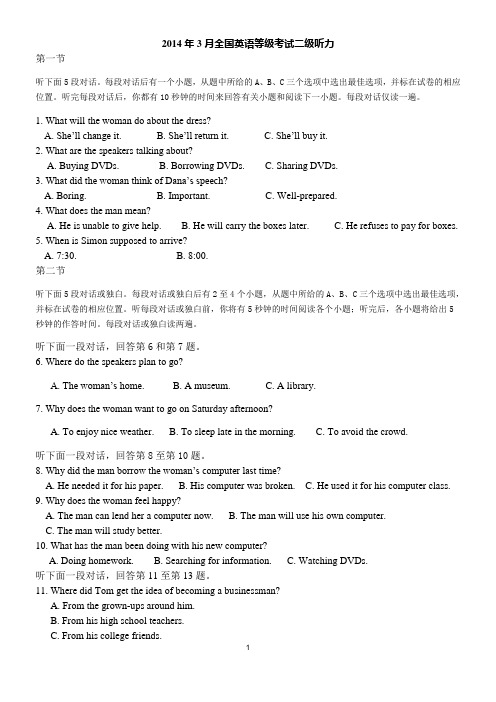
2014年3月全国英语等级考试二级听力第一节听下面5段对话。
每段对话后有一个小题,从题中所给的A、B、C三个选项中选出最佳选项,并标在试卷的相应位置。
听完每段对话后,你都有10秒钟的时间来回答有关小题和阅读下一小题。
每段对话仅读一遍。
1. What will the woman do about the dress?A. She’ll change it.B. She’ll return it.C. She’ll buy it.2. What are the speakers talking about?A. Buying DVDs.B. Borrowing DVDs.C. Sharing DVDs.3. What did the woman think of Dana’s speech?A. Boring.B. Important.C. Well-prepared.4. What does the man mean?A. He is unable to give help.B. He will carry the boxes later.C. He refuses to pay for boxes.5. When is Simon supposed to arrive?A. 7:30.B. 8:00.第二节听下面5段对话或独白。
每段对话或独白后有2至4个小题,从题中所给的A、B、C三个选项中选出最佳选项,并标在试卷的相应位置。
听每段对话或独白前,你将有5秒钟的时间阅读各个小题;听完后,各小题将给出5秒钟的作答时间。
每段对话或独白读两遍。
听下面一段对话,回答第6和第7题。
6. Where do the speakers plan to go?A. The woman’s home.B. A museum.C. A library.7. Why does the woman want to go on Saturday afternoon?A. To enjoy nice weather.B. To sleep late in the morning.C. To avoid the crowd.听下面一段对话,回答第8至第10题。
公共英语等级考试_2015年9月公共英语二级考试真题及答案
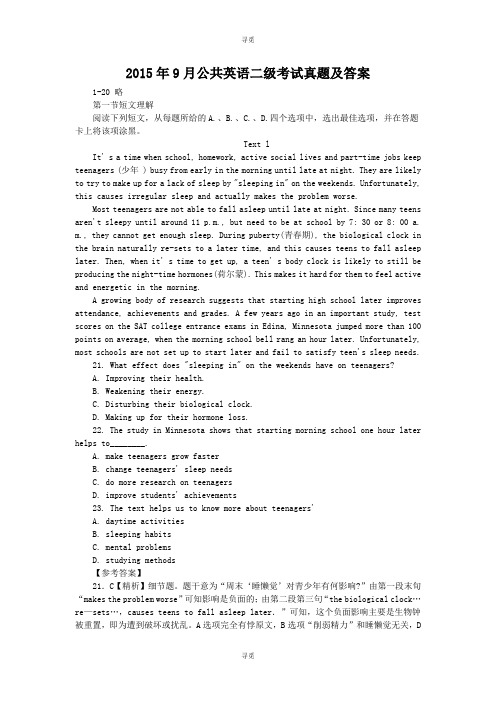
2015年9月公共英语二级考试真题及答案1-20 略第一节短文理解阅读下列短文,从每题所给的A.、B.、C.、D.四个选项中,选出最佳选项,并在答题卡上将该项涂黑。
Text lIt' s a time when school, homework, active social lives and part-time jobs keep teenagers (少年 ) busy from early in the morning until late at night. They are likely to try to make up for a lack of sleep by "sleeping in" on the weekends. Unfortunately, this causes irregular sleep and actually makes the problem worse.Most teenagers are not able to fall asleep until late at night. Since many teens aren't sleepy until around 11 p.m., but need to be at school by 7: 30 or 8: 00 a. m., they cannot get enough sleep. During puberty(青春期), the biological clock in the brain naturally re-sets to a later time, and this causes teens to fall asleep later. Then, when it' s time to get up, a teen' s body clock is likely to still be producing the night-time hormones(荷尔蒙). This makes it hard for them to feel active and energetic in the morning.A growing body of research suggests that starting high school later improves attendance, achievements and grades. A few years ago in an important study, test scores on the SAT college entrance exams in Edina, Minnesota jumped more than 100 points on average, when the morning school bell rang an hour later. Unfortunately, most schools are not set up to start later and fail to satisfy teen's sleep needs.21. What effect does "sleeping in" on the weekends have on teenagers?A. Improving their health.B. Weakening their energy.C. Disturbing their biological clock.D. Making up for their hormone loss.22. The study in Minnesota shows that starting morning school one hour later helps to________.A. make teenagers grow fasterB. change teenagers' sleep needsC. do more research on teenagersD. improve students' achievements23. The text helps us to know more about teenagers'A. daytime activitiesB. sleeping habitsC. mental problemsD. studying methods【参考答案】21.C【精析】细节题。
2015年9月公共英语二级考试真题及答案(阅读)
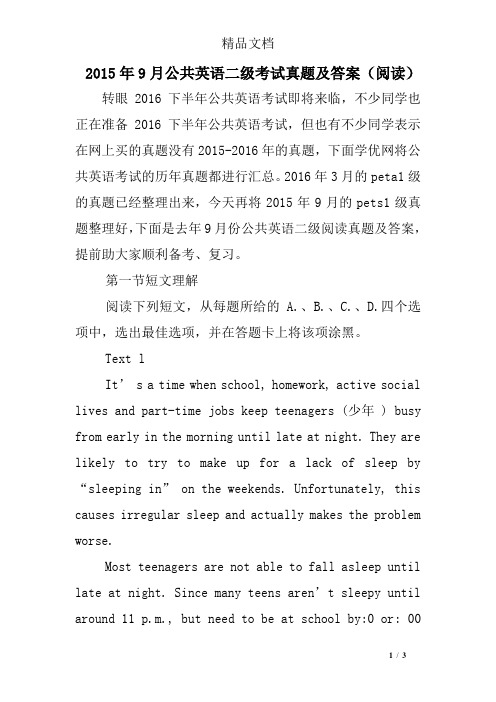
2015年9月公共英语二级考试真题及答案(阅读)转眼2016下半年公共英语考试即将来临,不少同学也正在准备2016下半年公共英语考试,但也有不少同学表示在网上买的真题没有2015-2016年的真题,下面学优网将公共英语考试的历年真题都进行汇总。
2016年3月的peta1级的真题已经整理出来,今天再将2015年9月的pets1级真题整理好,下面是去年9月份公共英语二级阅读真题及答案,提前助大家顺利备考、复习。
第一节短文理解阅读下列短文,从每题所给的 A.、B.、C.、D.四个选项中,选出最佳选项,并在答题卡上将该项涂黑。
Text lIt’ s a time when school, homework, active social lives and part-time jobs keep teenagers (少年 ) busy from early in the morning until late at night. They are likely to try to make up for a lack of sleep by “sleeping in” on the weekends. Unfortunately, this causes irregular sleep and actually makes the problem worse.Most teenagers are not able to fall asleep until late at night. Since many teens aren’t sleepy until around 11 p.m., but need to be at school by:0 or: 00a. m., they cannot get enough sleep. During puberty(青春期), the biological clock in the brain naturally re-sets to a later time, and this causes teens to fall asleep later. Then, when it’ s time to get up, a teen’ s body clock is likely to still be producing the night-time hormones(荷尔蒙). This makes it hard for them to feel active and energetic in the morning.A growing body of research suggests that starting high school later improves attendance, achievements and grades. A few years ago in an important study, test scores on the SAT college entrance exams in Edina, Minnesota jumped more than 100 points on average, when the morning school bell rang an hour later. Unfortunately, most schools are not set up to start later and fail to satisfy teen’s sleep needs.1. What effect does “sleeping in”on the weekends have on teenagers?A. Improving their health.B. Weakening their energy.C. Disturbing their biological clock.D. Making up for their hormone loss.2. The study in Minnesota shows that startingmorning school one hour later helps to________.A. make teenagers grow fasterB. change teenagers’ sleep needsC. do more research on teenagersD. improve students’ achievements3. The text helps us to know more about teenagers’12345免责声明:本文仅代表作者个人观点,与本网无关。
(完整word)2015年高考全国卷2英语试题与答案解析,推荐文档
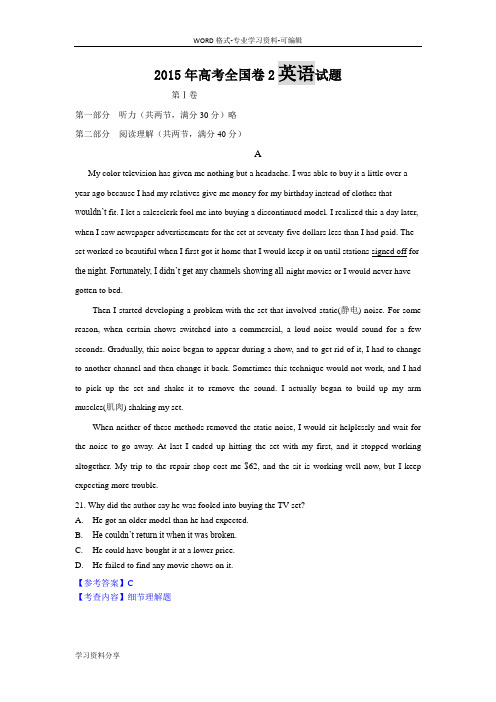
2015年高考全国卷2英语试题第Ⅰ卷第一部分听力(共两节,满分30分)略第二部分阅读理解(共两节,满分40分)AMy color television has given me nothing but a headache. I was able to buy it a little over a year ago because I had my relatives give me money for my birthday instead of clothes that wouldn’t fit. I let a salesclerk fool me into buying a discontinued model. I realized this a day later, when I saw newspaper advertisements for the set at seventy-five dollars less than I had paid. The set worked so beautiful when I first got it home that I would keep it on until stations signed off for the night. Fortunately, I didn’t get any channels showing all-night movies or I would never have gotten to bed.Then I started developing a problem with the set that involved static(静电) noise. For some reason, when certain shows switched into a commercial, a loud noise would sound for a few seconds. Gradually, this noise began to appear during a show, and to get rid of it, I had to change to another channel and then change it back. Sometimes this technique would not work, and I had to pick up the set and shake it to remove the sound. I actually began to build up my arm muscles(肌肉) shaking my set.When neither of these methods removed the static noise, I would sit helplessly and wait for the noise to go away. At last I ended up hitting the set with my first, and it stopped working altogether. My trip to the repair shop cost me $62, and the sit is working well now, but I keep expecting more trouble.21. Why did the author say he was fooled into buying the TV set?A.He got an older model than he had expected.B.He couldn’t return it when it was broken.C.He could have bought it at a lower price.D.He failed to find any movie shows on it.【参考答案】C【考查内容】细节理解题【解析思路】根据第一段第四行“when I saw newspaper advertisements for the set at seventy-five dollars less than I had paid.”当我看到报纸上75美元比我买的价格低的时候,我感觉我上当了。
2015年9月pets2真题及答案(附原文填空)

2.18 2015年9月pets 2 真题(刘兰英老师校对)听下面五段材料,回答第1-5题1. What are the speakers talking about?A. Holiday plansB. Moving to New YorkC. A party with old friends2. What is the woman going to do on Sunday?A. Go to the beach with the manB. Have a dinner with her familyC. Receive some guests at home3. What is the probable relationship between the speakers?A. ColleaguesB. NeighborsC. Strangers4. What do we know about John’s new job?A. It is well paid.B. It is near his home.C. It has long working hours.5. What does Kate promise to do?A. Answer phone calls for Jim.B. Go to a meeting with Jim.C. Send a message to Jim.听下面一段对话,回答第6和第7题。
6. When does the museum close?A. At 3:30.B. At 3:40.C. At 4:00.7. What is the man probably going to do?A. Tour the museum quickly.B. Pay full price for the ticket.C. Visit the museum tomorrow.听下面一段对话,回答第8至第10题。
(完整word版)2015年英语高考试题及答案解析全国卷2,推荐文档
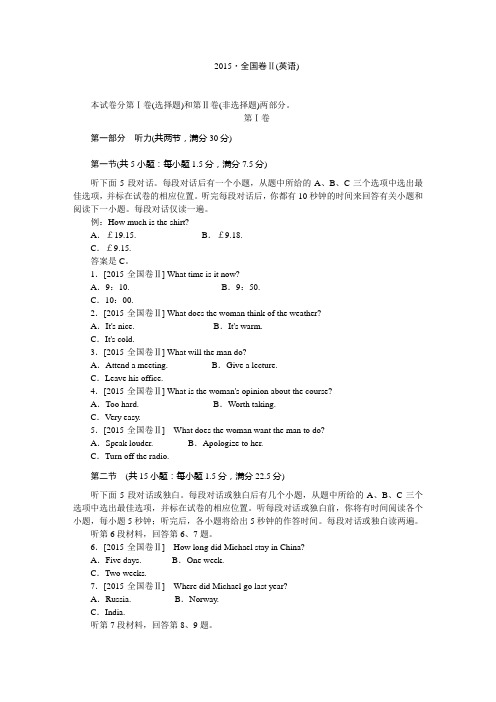
2015·全国卷Ⅱ(英语)本试卷分第Ⅰ卷(选择题)和第Ⅱ卷(非选择题)两部分。
第Ⅰ卷第一部分听力(共两节,满分30分)第一节(共5小题:每小题1.5分,满分7.5分)听下面5段对话。
每段对话后有一个小题,从题中所给的A、B、C三个选项中选出最佳选项,并标在试卷的相应位置。
听完每段对话后,你都有10秒钟的时间来回答有关小题和阅读下一小题。
每段对话仅读一遍。
例:How much is the shirt?A.£19.15. B.£9.18.C.£9.15.答案是C。
1.[2015·全国卷Ⅱ] What time is it now?A.9:10. B.9:50.C.10:00.2.[2015·全国卷Ⅱ] What does the woman think of the weather?A.It's nice. B.It's warm.C.It's cold.3.[2015·全国卷Ⅱ] What will the man do?A.Attend a meeting. B.Give a lecture.C.Leave his office.4.[2015·全国卷Ⅱ] What is the woman's opinion about the course?A.Too hard. B.Worth taking.C.Very easy.5.[2015·全国卷Ⅱ] What does the woman want the man to do?A.Speak louder. B.Apologize to her.C.Turn off the radio.第二节(共15小题:每小题1.5分,满分22.5分)听下面5段对话或独白。
每段对话或独白后有几个小题,从题中所给的A、B、C三个选项中选出最佳选项,并标在试卷的相应位置。
2015年度英语高考浙江卷

2015年普通高等学校招生全国统一考试(浙江卷)选择题部分(共80分)第一部分英语知识运用(共两节,满分30分)第一节单项填空(共20小题;每小题0.5分,满分10分)从A、B、C和D四个选项中,选出可以填入空白处的最佳选项。
1.—Hi,John.Are you busy?—________A.Yes.I do agree.B.Yes.That would be nice.C.No.Are you sure?D.No.What’s up?答案 D解析考查交际用语。
句意为:——你好,约翰。
你忙吗?——不忙,有什么事吗?No.What’s up?不,怎么了,有什么事吗,符合语境。
Yes.I do agree.是的,我的确同意;Yes.That would be nice.是的,那太好了;No.Are you sure?不,你确定吗?2.Jane’s grandmother had wanted to write ________ children’s book for many years,but one thing or another always got in ________ way.A.a;/ B.the;the C./;the D.a;the答案 D解析考查冠词。
句意为:简的奶奶多年来一直想写一本儿童书籍,但总有这样那样的事情阻碍她不能实现。
第一空表泛指,故用不定冠词a;第二空为固定表达in the way妨碍,阻碍。
3.Have you ever heard of the trees that are homes ________ animals both on land and sea?A.about B.to C.with D.over答案 B解析本题考查固定搭配。
句意为:你听说过是海陆两栖动物栖息地的树吗?be home to 为固定搭配,意为“是……的栖息地,是……的家园”。
4.It was so noisy that we ________ hear ourselves speak.A.couldn’t B.shouldn’tC.mustn’t D.needn’t答案 A解析考查情态动词辨析。
2015年高考英语试卷听力+原文+答案(新课标Ⅰ、Ⅱ)
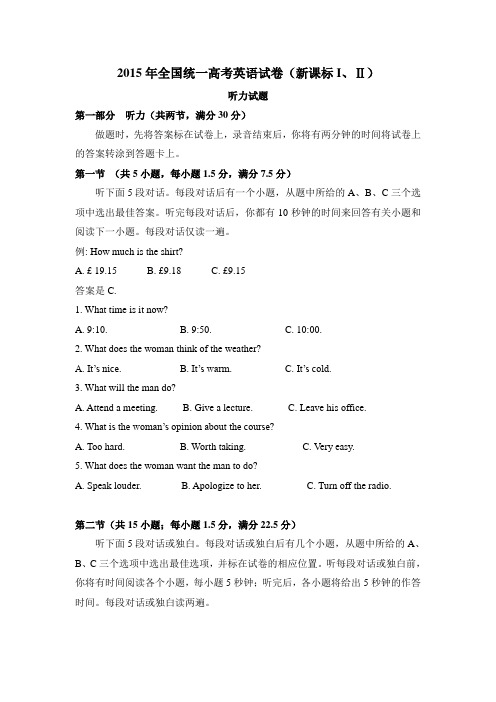
2015年全国统一高考英语试卷(新课标I、Ⅱ)听力试题第一部分听力(共两节,满分30分)做题时,先将答案标在试卷上,录音结束后,你将有两分钟的时间将试卷上的答案转涂到答题卡上。
第一节(共5小题,每小题1.5分,满分7.5分)听下面5段对话。
每段对话后有一个小题,从题中所给的A、B、C三个选项中选出最佳答案。
听完每段对话后,你都有10秒钟的时间来回答有关小题和阅读下一小题。
每段对话仅读一遍。
例: How much is the shirt?A. £ 19.15B. £9.18C. £9.15答案是C.1. What time is it now?A. 9:10.B. 9:50.C. 10:00.2. What does the woman think of the weather?A. It’s nice.B. It’s warm.C. It’s cold.3. What will the man do?A. Attend a meeting.B. Give a lecture.C. Leave his office.4. What is the woman’s opinion about the course?A. Too hard.B. Worth taking.C. Very easy.5. What does the woman want the man to do?A. Speak louder.B. Apologize to her.C. Turn off the radio.第二节(共15小题;每小题1.5分,满分22.5分)听下面5段对话或独白。
每段对话或独白后有几个小题,从题中所给的A、B、C三个选项中选出最佳选项,并标在试卷的相应位置。
听每段对话或独白前,你将有时间阅读各个小题,每小题5秒钟;听完后,各小题将给出5秒钟的作答时间。
每段对话或独白读两遍。
2015年9月浙江高考英语听力(PETS-2)试题,原文及答案
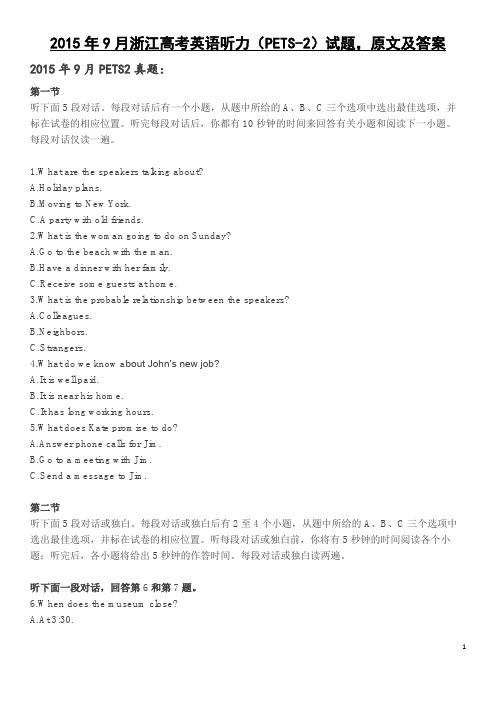
2015年9月浙江高考英语听力(PETS-2)试题,原文及答案2015年9月PETS2真题:第一节听下面5段对话。
每段对话后有一个小题,从题中所给的A、B、C三个选项中选出最佳选项,并标在试卷的相应位置。
听完每段对话后,你都有10秒钟的时间来回答有关小题和阅读下一小题。
每段对话仅读一遍。
1.What are the speakers talking about?A.Holiday plans.B.Moving to New York.C.A party with old friends.2.What is the woman going to do on Sunday?A.Go to the beach with the man.B.Have a dinner with her family.C.Receive some guests at home.3.What is the probable relationship between the speakers?A.Colleagues.B.Neighbors.C.Strangers.4.What do we know a bout John’s new job?A.It is well paid.B.It is near his home.C.It has long working hours.5.What does Kate promise to do?A.Answer phone calls for Jim.B.Go to a meeting with Jim.C.Send a message to Jim.第二节听下面5段对话或独白。
每段对话或独白后有2至4个小题,从题中所给的A、B、C三个选项中选出最佳选项,并标在试卷的相应位置。
听每段对话或独白前,你将有5秒钟的时间阅读各个小题;听完后,各小题将给出5秒钟的作答时间。
每段对话或独白读两遍。
2015年全国统一高考英语试卷听力+原文+答案(新课标Ⅰ、Ⅱ)
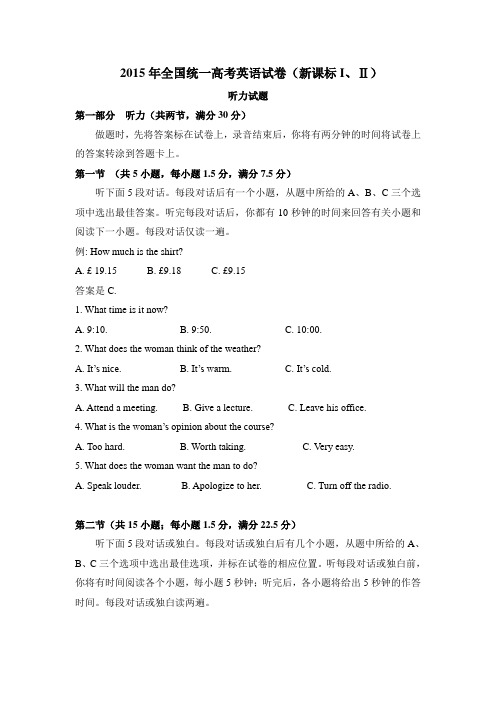
2015年全国统一高考英语试卷(新课标I、Ⅱ)听力试题第一部分听力(共两节,满分30分)做题时,先将答案标在试卷上,录音结束后,你将有两分钟的时间将试卷上的答案转涂到答题卡上。
第一节(共5小题,每小题1.5分,满分7.5分)听下面5段对话。
每段对话后有一个小题,从题中所给的A、B、C三个选项中选出最佳答案。
听完每段对话后,你都有10秒钟的时间来回答有关小题和阅读下一小题。
每段对话仅读一遍。
例: How much is the shirt?A. £ 19.15B. £9.18C. £9.15答案是C.1. What time is it now?A. 9:10.B. 9:50.C. 10:00.2. What does the woman think of the weather?A. It’s nice.B. It’s warm.C. It’s cold.3. What will the man do?A. Attend a meeting.B. Give a lecture.C. Leave his office.4. What is the woman’s opinion about the course?A. Too hard.B. Worth taking.C. Very easy.5. What does the woman want the man to do?A. Speak louder.B. Apologize to her.C. Turn off the radio.第二节(共15小题;每小题1.5分,满分22.5分)听下面5段对话或独白。
每段对话或独白后有几个小题,从题中所给的A、B、C三个选项中选出最佳选项,并标在试卷的相应位置。
听每段对话或独白前,你将有时间阅读各个小题,每小题5秒钟;听完后,各小题将给出5秒钟的作答时间。
每段对话或独白读两遍。
2015年普通高等学校招生全国统一考试英语试题(浙江卷,含解析)

2015年普通高等学校招生全国统一考试英语试题(浙江卷,解析版)选择题部分(共80分)第一部分:英语知识运用(共两节,满分30分!第一节:单项填空(共20小题;每小题0.5分,满分10分)从A、B、C和D四个选项中,选出可以填入空白处的最佳选项,并在答题纸上将该选项标号涂黑。
1. ——Hi, John. Are you busy?——A. Yes.I do agree.B. Yes.That would be nice.C. No.Are you sure?D. No.What’s up?【答案】D考点:考查交际用语2. Jane’s grandmother had wanted to write children’s book for many years, but one thing or another always got in way.A. a;不填B. the;theC. 不填;theD. a;the【答案】D【解析】试题分析:句意:多年来,简的奶奶想写一本有关于儿童的书,但总是被这样或那样的原因阻碍了。
第一个空使用不定冠词表泛指,第二个in the way 是固定搭配,意为挡道或阻碍。
定冠词用于特指或者是固定搭配,不定冠词用于泛指。
考点:考查冠词的使用3. Have you ever heard of the trees that are homes animals both on land and sea?A. aboutB. toC. withD. over【答案】 B【解析】试题分析:句意:你是否有听说过树是陆上动物和海上动物的家?home to sth 固定搭配,是什么的家园的意思。
该句是一个疑问句,其中还含有一个定语从句。
比如这个句子转化为陈述句应该是You have ever heard of the trees that are homes animals both on land and sea? 然后把定语从句单独拿出来看将会是trees are homes animals both on land and sea. 根据固定搭配自然知道答案是to。
2015年普通高等学校招生全国统一考试英语试题(浙江卷,含解析)
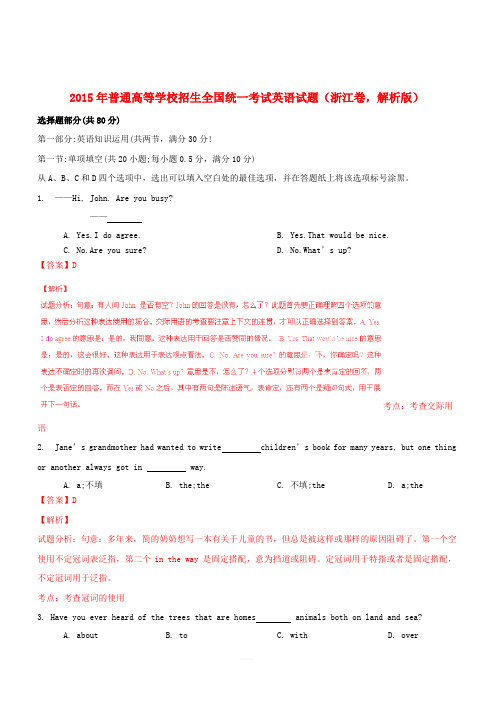
2015年普通高等学校招生全国统一考试英语试题(浙江卷,解析版)选择题部分(共80分)第一部分:英语知识运用(共两节,满分30分!第一节:单项填空(共20小题;每小题0.5分,满分10分)从A、B、C和D四个选项中,选出可以填入空白处的最佳选项,并在答题纸上将该选项标号涂黑。
1. ——Hi, John. Are you busy?——A. Yes.I do agree.B. Yes.That would be nice.C. No.Are you sure?D. No.What’s up?【答案】D考点:考查交际用语2. Jane’s grandmother had wanted to write children’s book for many years, but one thing or another always got in way.A. a;不填B. the;theC. 不填;theD. a;the【答案】D【解析】试题分析:句意:多年来,简的奶奶想写一本有关于儿童的书,但总是被这样或那样的原因阻碍了。
第一个空使用不定冠词表泛指,第二个in the way 是固定搭配,意为挡道或阻碍。
定冠词用于特指或者是固定搭配,不定冠词用于泛指。
考点:考查冠词的使用3. Have you ever heard of the trees that are homes animals both on land and sea?A. aboutB. toC. withD. over【答案】 B【解析】试题分析:句意:你是否有听说过树是陆上动物和海上动物的家?home to sth 固定搭配,是什么的家园的意思。
该句是一个疑问句,其中还含有一个定语从句。
比如这个句子转化为陈述句应该是You have ever heard of the trees that are homes animals both on land and sea? 然后把定语从句单独拿出来看将会是trees are homes animals both on land and sea. 根据固定搭配自然知道答案是to。
- 1、下载文档前请自行甄别文档内容的完整性,平台不提供额外的编辑、内容补充、找答案等附加服务。
- 2、"仅部分预览"的文档,不可在线预览部分如存在完整性等问题,可反馈申请退款(可完整预览的文档不适用该条件!)。
- 3、如文档侵犯您的权益,请联系客服反馈,我们会尽快为您处理(人工客服工作时间:9:00-18:30)。
2015年9月浙江高考英语听力(PETS-2)试题,原文及答案2015年9月PETS2真题:第一节听下面5段对话。
每段对话后有一个小题,从题中所给的A、B、C三个选项中选出最佳选项,并标在试卷的相应位置。
听完每段对话后,你都有10秒钟的时间来回答有关小题和阅读下一小题。
每段对话仅读一遍。
1.What are the speakers talking about?A.Holiday plans.B.Moving to New York.C.A party with old friends.2.What is the woman going to do on Sunday?A.Go to the beach with the man.B.Have a dinner with her family.C.Receive some guests at home.3.What is the probable relationship between the speakers?A.Colleagues.B.Neighbors.C.Strangers.4.What do we know a bout John’s new job?A.It is well paid.B.It is near his home.C.It has long working hours.5.What does Kate promise to do?A.Answer phone calls for Jim.B.Go to a meeting with Jim.C.Send a message to Jim.第二节听下面5段对话或独白。
每段对话或独白后有2至4个小题,从题中所给的A、B、C三个选项中选出最佳选项,并标在试卷的相应位置。
听每段对话或独白前,你将有5秒钟的时间阅读各个小题;听完后,各小题将给出5秒钟的作答时间。
每段对话或独白读两遍。
听下面一段对话,回答第6和第7题。
6.When does the museum close?A.At 3:30.C.At 4:00.7.What is the man probably going to do?A.Tour the museum quickly.B.Pay full price for the ticket.C.Visit the museum tomorrow.听下面一段对话,回答第8至第10题。
8.What problem does Tom have?A.He has no license to drive a car.B.He is too busy to go swimming.C.He can’t find the sports center.9.What does Tom offer to do for Jane?A.Pay for her sports center ticket.B.Take her out for a nice dinner.C.Help her with the homework.10.What is Jane worried about?A.Her book report.B.The mid-term exam.C.Tom’s weekend plan.听下面一段对话,回答第11和第12题。
11.Where does the conversation probably take place?A.In a ticket office.B.In a department store.C.In an information centre.12.What will the man probably do?A.Tour the city.B.Visit an island.C.Buy a booklet.听下面一段对话,回答第13至第16题。
13.How many languages has Dr. Green’s new book been translated into?A.5.B.13.C.30.14.Where did the Slow Food Movement begin?A.In Italy.C.In Germany.15.What did the study in Britain find out?A.More children make friends on the Internet.B.More children think friendship is important.C.More children say they have no best friend.16.What is the main idea Dr. Green tries to express in the talk?A.To be slow means to focus on quality.B.Friendship should be developed slowly.C.The British support the Slow Movement.听下面一段独白,回答第17至第20题。
17.Where does the speaker come from?A.Canada.B.England.C.Thailand.18.How does the speaker view the English lessons here in schools?A.They are not special.B.They are not enough.C.They are not interesting.19.In what way are the speaker’s English programs different?A.They are designed in various styles.B.They are broadcast live every day.C.They are based on the computer.20.What does the speaker expect people to do?A.Attend their English classes.B.Practice their English every day.C.Watch English movies and TV shows.2015年9月PETS-2听力录音原文:Text1M: Are you going anywhere for Christmas?W: I thought about going to my sister's in New York. How about you?M: I'll probably just stay at home.Text2M: I'm going to the beach this Sunday. Would you like to come?W: Oh, Sunday's a bit of a problem. Some of my friends are coming for a dinner at my place. What about Saturday?Text3W:Mr. Baker, could I possibly use your phone? Ours doesn’t work. Judy is ill, and I want to call a doctor.M:Sure. Come on in. Hope everyt hing’s well with Judy.Text4W: Congratulations, John! I heard about your new job.M: Thanks. It's nearly perfect for me. The working hours are convenient, and it's an easy walk from home. If only the pay were half as good as everything else!Text5M: Kate, I'm going to a meeting tomorrow. Would you please help take my phone calls?W:No problem, Jim. I'll take a message if anyone calls.Text6M: Excuse me. One ticket, please. Do you give students a discount?W:We do, but the museum will close in twenty minutes. We stop selling tickets at 3:30. It's 3:40 now.M: Could you possibly let me go in for a quick look? I can pay the full price.W:I’m sorry, I can't. And it's not really worth it because you won't be able to see everything within twenty minutes. You can come back tomorrow morning. The museum opens at nine o'clock.M:Well, in that case, I’ll do what you say.Text7W: Hi, Tom. How are you?M:Hi, Jane. I'm fine. Listen, I plan to go swimming in the sports center this weekend. But it's a long way, and I haven't got my driver’s license yet. How about us going together in your car? I'll buy the tickets.W:Well, it's great, but I’ve got homework to do.M:Come on! It doesn’t matter that you go out for one afternoon.W:Oh, I really can't. Although I finished my book report, the upcoming mid-term exam really makes me nervous. I don’t think I’d enjoy an outing now. Sorry I can’t drive you.M:Oh, don’t worry. I can find someone else. Good luck with your exam!W: Thanks. See you!M:Bye!Text8M: Hello. I'd like this guidebook, please. How much is it?W: All things are free here.M: Oh, thanks. I'll stay in the city for one week. Could you tell me what places I should visit?W: Well, there are a lot. Are you interested in islands, such as Lantau?M: Islands?W:Yes. There are a lot of interesting things you can see — old villages and churches. And the scenery is beautiful. Take this booklet. It tells you more.M:Thank you very much. That’s a great suggestion.W: You are welcome.Text9W:Dr. Green, congratulations on the success of your new book! We learned that it has been translated into 30 languages — English, of course, French, German, Japanese, Chinese, and so on.M: Thanks, Helen.W: Well, could you tell us what this popular book is about?M:It’s called In Praise of Slow. It's about how the world got stuck in fast-forward, and how more and more people everywhere are slowing down. In other words, it’s about the rise of the Slow Movement.W: What is the Slow Movement?M:It is a revolution against the idea that faster is always better. When I say “slow”,I don’t mean doing everything slowly. It’s about doing everything as well as possible, instead of as fast as possible. It’s about quality in everything we do.W:When and where was this “slow” idea b orn?M:It was born in the early 1990s in Italy. It began as the Slow Food Movement,which centered on food. More recently, “slow” has become popular worldwide.W: Have we reached the point of trying to speed up something that cannot really be sped up?M: Of course. The Internet connects us in wonderful ways, but it also leads us into trying to hurry up relationships. So you find people online saying they have more than 4,000 friends. The very idea of friendship is not considered important. And we may be losing the ability to make friends. In Britain, a study found that in the past ten years, the number of children who say they have no best friend rose from under one in eight to nearly one in five!Text10Good morning, everyone. I'm pleased to be here to give a talk. We’re two brothers from Canada, and we’ve been living in Thailand for eight years. We noticed that most English lessons here in schools focus only on reading and writing, so a lot of people can’t understand and speak well in English. And we’d like to do something about it. Our idea is simple: we want to teach people how to understand and speak English like a native speaker. Different from broadcast English programs, we design special fun English programs based on the computer and use them to teach words and expressions we use in real life. We talk in a casual style on a number of interesting topics, and we share personal stories from our real lives. Now, we have over 200 units on our website. We make a new unit every week that you can listen to on your computer anytime you want. Our materials are from English movies, TV shows, and real-life conversations. We hope people will use the materials to practice every day. We are sure that your English will improve a lot. 2015年9月PETS-2听力参考答案:1-5ACBBA 6-10 CCAAB 11-15 CBCAC 16-20 AABCB。
